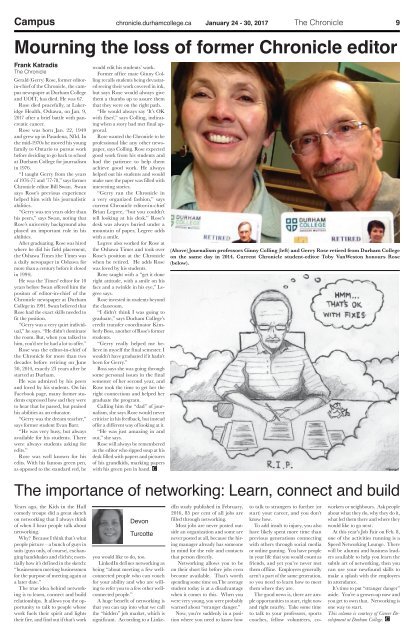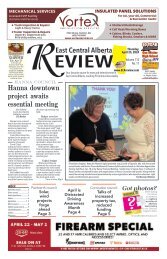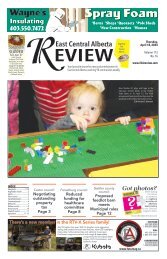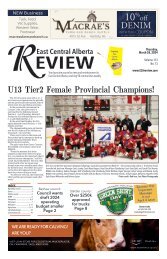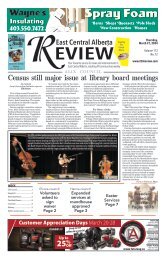CHRONICLE 16-17 ISSUE 08
You also want an ePaper? Increase the reach of your titles
YUMPU automatically turns print PDFs into web optimized ePapers that Google loves.
Campus chronicle.durhamcollege.ca January 24 - 30, 20<strong>17</strong> The Chronicle 9<br />
Mourning the loss of former Chronicle editor<br />
Frank Katradis<br />
The Chronicle<br />
Gerald (Gerry) Rose, former editorin-chief<br />
of the Chronicle, the campus<br />
newspaper at Durham College<br />
and UOIT, has died. He was 67.<br />
Rose died peacefully, at Lakeridge<br />
Health, Oshawa, on Jan. 9,<br />
20<strong>17</strong> after a brief battle with pancreatic<br />
cancer.<br />
Rose was born Jan. 22, 1949<br />
and grew up in Pasadena, Nfld. In<br />
the mid-1970s he moved his young<br />
family to Ontario to pursue work<br />
before deciding to go back to school<br />
at Durham College for journalism<br />
in 1976.<br />
“I taught Gerry from the years<br />
of 1976-77 and ’77-78,” says former<br />
Chronicle editor Bill Swan. Swan<br />
says Rose’s previous experience<br />
helped him with his journalistic<br />
abilities.<br />
“Gerry was ten years older than<br />
his peers,” says Swan, noting that<br />
Rose’s university background also<br />
played an important role in his<br />
abilities.<br />
After graduating, Rose was hired<br />
where he did his field placement,<br />
the Oshawa Times (the Times was<br />
a daily newspaper in Oshawa for<br />
more than a century before it closed<br />
in 1994).<br />
He was the Times' editor for 10<br />
years before Swan offered him the<br />
positon of editor-in-chief of the<br />
Chronicle newspaper at Durham<br />
College in 1991. Swan believed that<br />
Rose had the exact skills needed to<br />
fit the position.<br />
“Gerry was a very quiet individual,”<br />
he says. “He didn’t dominate<br />
the room. But, when you talked to<br />
him, you’d see he had a lot to offer.”<br />
Rose was the editor-in-chief of<br />
the Chronicle for more than two<br />
decades before retiring on June<br />
30, 2014, exactly 23 years after he<br />
started at Durham.<br />
He was admired by his peers<br />
and loved by his students. On his<br />
Facebook page, many former students<br />
expressed how sad they were<br />
to hear that he passed, but praised<br />
his abilities as an educator.<br />
“Gerry was the dream teacher,”<br />
says former student Evan Barr.<br />
“He was very busy, but always<br />
available for his students. There<br />
were always students asking for<br />
edits.”<br />
Rose was well known for his<br />
edits. With his famous green pen,<br />
as opposed to the standard red, he<br />
would edit his students’ work.<br />
Former office mate Ginny Colling<br />
recalls students being devastated<br />
seeing their work covered in ink,<br />
but says Rose would always give<br />
them a thumbs up to assure them<br />
that they were on the right path.<br />
“He would always say ‘It’s OK<br />
with fixes',” says Colling, indicating<br />
when a story had met final approval.<br />
Rose wanted the Chronicle to be<br />
professional like any other newspaper,<br />
says Colling. Rose expected<br />
good work from his students and<br />
had the patience to help them<br />
achieve good work. He always<br />
helped out his students and would<br />
make sure the paper was filled with<br />
interesting stories.<br />
“Gerry ran the Chronicle in<br />
a very organized fashion,” says<br />
current Chronicle editor-in-chief<br />
Brian Legree, “but you couldn’t<br />
tell looking at his desk.” Rose’s<br />
desk was always buried under a<br />
mountain of paper, Legree adds<br />
with a smile.<br />
Legree also worked for Rose at<br />
the Oshawa Times and took over<br />
Rose’s position at the Chronicle<br />
when he retired. He adds Rose<br />
was loved by his students.<br />
Rose taught with a “get it done<br />
right attitude, with a smile on his<br />
face and a twinkle in his eye,” Legree<br />
says.<br />
Rose invested in students beyond<br />
the classroom.<br />
“I didn’t think I was going to<br />
graduate,” says Durham College’s<br />
credit transfer coordinator Kimberly<br />
Boss, another of Rose’s former<br />
students.<br />
“Gerry really helped me believe<br />
in myself the final semester. I<br />
wouldn’t have graduated if it hadn’t<br />
been for Gerry.”<br />
Boss says she was going through<br />
some personal issues in the final<br />
semester of her second year, and<br />
Rose took the time to get her the<br />
right connections and helped her<br />
graduate the program.<br />
Calling him the “dad” of journalism,<br />
she says Rose would never<br />
criticize in his feedback, but instead<br />
offer a different way of looking at it.<br />
“He was just amazing in and<br />
out,” she says.<br />
Rose will always be remembered<br />
as the editor who sipped soup at his<br />
desk filled with papers and pictures<br />
of his grandkids, marking papers<br />
with his green pen in hand.<br />
(Above) Journalism professors Ginny Colling (left) and Gerry Rose retired from Durham College<br />
on the same day in 2014. Current Chronicle student-editor Toby VanWeston honours Rose<br />
(below).<br />
The importance of networking: Learn, connect and build<br />
Years ago, the Kids in the Hall<br />
comedy troupe did a great sketch<br />
on networking that I always think<br />
of when I hear people talk about<br />
networking.<br />
Why? Because I think that’s what<br />
people picture – a bunch of guys in<br />
suits (guys only, of course), exchanging<br />
handshakes and clichés; essentially<br />
how it’s defined in the sketch:<br />
“businessmen meeting businessmen<br />
for the purpose of meeting again at<br />
a later date.”<br />
The true idea behind networking<br />
is to learn, connect and build<br />
relationships. It allows you the opportunity<br />
to talk to people whose<br />
work fuels their spirit and lights<br />
their fire, and find out if that’s work<br />
Devon<br />
Turcotte<br />
you would like to do, too.<br />
LinkedIn defines networking as<br />
being “about meeting a few wellconnected<br />
people who can vouch<br />
for your ability and who are willing<br />
to refer you to a few other wellconnected<br />
people.”<br />
A huge benefit of networking is<br />
that you can tap into what we call<br />
the “hidden” job market, which is<br />
significant. According to a LinkedIn<br />
study published in February,<br />
20<strong>16</strong>, 85 per cent of all jobs are<br />
filled through networking.<br />
Most jobs are never posted outside<br />
an organization and some are<br />
never posted at all, because the hiring<br />
manager already has someone<br />
in mind for the role and contacts<br />
that person directly.<br />
Networking allows you to be<br />
on their short list before jobs even<br />
become available. That’s worth<br />
spending some time on.The average<br />
student today is at a disadvantage<br />
when it comes to this. When you<br />
were very young, you were probably<br />
warned about “stranger danger.”<br />
Now, you’re suddenly in a position<br />
where you need to know how<br />
to talk to strangers to further (or<br />
start) your career, and you don’t<br />
know how.<br />
To add insult to injury, you also<br />
have likely spent more time than<br />
previous generations connecting<br />
with others through social media<br />
or online gaming. You have people<br />
in your life that you would count as<br />
friends, and yet you’ve never met<br />
them offline. Employers generally<br />
aren’t a part of the same generation,<br />
so you need to learn how to meet<br />
them where they are.<br />
The good news is, there are ample<br />
opportunities to start, right now<br />
and right nearby. Take some time<br />
to talk to your professors, sports<br />
coaches, fellow volunteers, coworkers<br />
or neighbours. Ask people<br />
about what they do, why they do it,<br />
what led them there and where they<br />
would like to go next.<br />
At this year’s Job Fair on Feb. 8,<br />
one of the activities running is a<br />
Speed Networking Lounge. There<br />
will be alumni and business leaders<br />
available to help you learn the<br />
subtle art of networking, then you<br />
can use your newfound skills to<br />
make a splash with the employers<br />
in attendance.<br />
It’s time to put “stranger danger”<br />
aside. You’re a grown-up now and<br />
you get to own that. Networking is<br />
one way to start.<br />
This column is courtesy of Career Development<br />
at Durham College.


